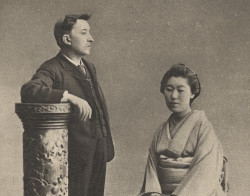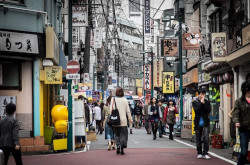
Originally published on metropolis.co.jp on October 2011

Cheeky devils
- Customs officials at Kansai Airport busted a Nigerian man attempting to enter the country with 86 bags of an unspecified drug in his stomach. The would-be smuggler said “he picked up the drugs in Paris and spent four to five hours swallowing the small bags, washing them down with water.”
- After being arrested for throwing his wife’s corpse in Tokyo’s Oyoko River, a 61-year-old man reportedly told police, “there is no doubt I dumped her in the river. I’ll discuss the details later.”
- A Tokyo-based software company has released an app called Karelog that allows PC users to monitor “the current whereabouts, phone call logs, remaining battery power and other personal data of a smartphone’s owner.”
- A Tokyo woman was arrested for counterfeiting ¥10,000 bills the old-fashioned way—with a color photocopier.
Coming and going
- A 65-year-old researcher at the National Institute for Japanese Language and Linguistics in Tokyo is believed to be the last living speaker of Worrongo, an Australian aboriginal language.
- The Hiroshima Prefectural Medical Association wants to send a team of doctors to North Korea to perform checkups on A-bomb survivors who moved to the country.
- A labor ministry survey found that 74 percent of Japanese temporary workers and part-timers earn less than ¥2 million a year.
- Japan’s most unlikely new tourist destination is a lake in Nikko that was created by rains from a typhoon in late August.
- In a survey of 58 free magazines and newspapers aimed at foreigners, the National Police Agency found 736 advertisements promoting criminal acts, such as overstaying visas or working in the sex industry. (You’d never see anything like that in Metropolis, of course.)
Foreign intrigue
- A 27-year-old Japanese woman studying English at a language school in Fiji was found dead in “unexplained circumstances.”
- Meanwhile, three Cameroon nationals in Malaysia pleaded not guilty in the death of a male Japanese tourist there in August.
- The Philippines deported a 34-year-old Japanese man who was wanted in Wakayama for stealing “more than ten cars” in 2005. The man had been living in the Philippines on an expired passport since 2006.
- A 71-year-old Japanese tourist was killed after he fell off a sightseeing trolley in Honolulu.
Your tax dollars at work
- It was reported that the government has allocated ¥1.5 billion in its new supplementary budget to “counter harmful rumors relating to the nuclear crisis.”
- One of the ways it will accomplish this is by inviting “prominent users of social media sites to Japan.”
- A report by the UN Human Rights Council has found that “although the vast majority of the population in Japan enjoys continuous access to safe drinking water and sanitation, there are pockets of exclusion which must be addressed.”
- The internal affairs ministry has announced that Japanese people aged 65 or older spend an average of ¥17,112 shopping online each year.
- The good news: TEPCO has finally started the process of compensating individuals affected by the crisis at the Fukushima nuclear plant.
- The bad news: the application form for receiving compensation is 60 pages long, and it’s accompanied by a 160-page instruction manual. Locals are said to be “furious” about the red tape.
Here and there
- For the third year in a row, private-sector salaries in Japan have risen. The average worker now takes home ¥4.12 million per year.
- Japan and Saudi Arabia signed an agreement that will pave the way for Japanese firms to provide “desalination of seawater, measures against water leaks and treatment of sewage” in the Middle Eastern kingdom.
- Three hundred and sixty-three passengers on a recent ANA flight from Naha to Haneda got an unwelcome surprise when the plane’s full complement of emergency oxygen masks were accidentally deployed.
- It was reported that the government is mulling on a plan to discharge 70,000 mental patients from hospitals nationwide as a way to lower its ¥1.8 trillion annual mental-health bill.
Field of screams
- Demonstrating a severe lack of salaryman spirit, Nippon Ham Fighters head coach Masataka Nashida announced that he was quitting at the end of the season. “It’s stressful doing this for eight years,” Nashida told reporters. “I want to take some time off for myself.”
- At the time of his announcement the Fighters had a 66-47-4 record, good for second place in the Pacific League and all but sewing up a spot in the Climax Series playoffs.
- A female high school student from Tokyo won a gold medal at the International Earth Science Olympics, held in Modena, Italy.
- For the third consecutive year, DoCoMo was number one in JD Power’s survey of top mobile phone services.
What’s German for “pussies”?
- It was reported that 80 out of 400 members of the Bavarian State Opera company refused to travel to Japan for a tour last month because of fears of radiation. The company airlifted bottled water from Germany for the rest of the troupe.
- The incoming administration of PM Yoshihiko Noda decided that it would not increase sanctions against North Korea, at least for now.
- The government has released about one-third of the $4.4 billion in Libyan assets it had frozen in June. It is hoping the money will be used for humanitarian purposes.
- Bottom Story of the Week: “Newly Discovered Gold Beetle Named After Author Morio Kita” (via The Mainichi Daily News).
Compiled from reports by AP, Japan Today, The Japan Times, The International Herald Tribune, The Asahi Shimbun, The Mainichi Daily News, Daily Yomiuri, AFP, Reuters and Kyodo







